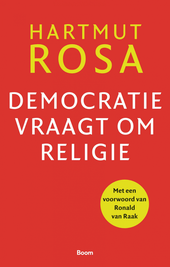
Against Aggression: Monstrous and Resonant Forms of Uncontrollability
In his book The Uncontrollability of the World (2020), German sociologist Hartmut Rosa argues that the late modern human being desires to control the world. However, to truly experience “life” and achieve resonance with the world, we must be open to its uncontrollability. Tonight, Rosa will be in conversation with philosophers Daniel Loick and Beate Roessler.
In its uncontrollability, the world is lively. According to Rosa, such a world moves and touches you. Hereby you are transformed in open-ended, unpredictable ways to better resonate with the uncontrollability of the world. However, late modernity brings with it a desire to control, engineer, and master every facet of the world. Our alienation from the world is one of the consequences of this desire to control. In the face of today’s ever-present focus on control, expansion and growth, we urgently need resonance. How will we achieve this? After a lecture by Hartmut Rosa, Daniel Loick will comment on the talk. Moderation: Beate Roessler.
About the speakers
Hartmut Rosa is Professor of Sociology and Social Theory at Friedrich-Schiller-Universität Jena and Director of the Max Weber Center for Advanced Cultural and Social Studies. Rosa is one of the main proponents of the fourth generation of critical theory. He is well known for his work on acceleration and modernity, and his theory of resonance. In continuation of these topics, Rosa wrote the book The Uncontrollability of the World (in Dutch: Onbeschikbaarheid, 2022). Rosa was recently awarded the prestigious Leibniz Prize for his work and is a member of the Academia Europaea. Rosa’s most recent book When Monsters Roar and Angels Sing (2023) is a (little) sociology of heavy metal.
Daniel Loick is Associate Professor for Political and Social Philosophy at the University of Amsterdam. He works on a critical theory of state-inflicted violence as well as on subaltern forms of sociality. He just published The Abuse of Property with MIT Press. Forthcoming in German is his new book Die Überlegenheit der Unterlegenen. Eine Theorie der Gegengemeinschaften with Suhrkamp (2024).
Beate Roessler (moderator) is Professor of Philosophy at the University of Amsterdam. She has published widely on topics in ethics, social, and political philosophy, among them Autonomie: ein Versuch über das gelungene Leben (Suhrkamp, 2017). She is a co-editor of the European Journal of Philosophy and a member of the Göttinger Akademie der Wissenschaften and of the American Academy of Arts and Sciences. Her book on Being Human in the Digital World which she is editing with Valerie Steeves is forthcoming with Cambridge UP (2024).


:rgb(-15)

:rgb(-25)

:rgb(8)
